I have a class with a method that returns an object of type User
public class CustomMembershipProvider : MembershipProvider
{
public virtual User GetUser(string username, string password, string email, bool isApproved)
{
return new User()
{
Name = username
,Password = EncodePassword(password)
,Email = email
,Status = (isApproved ? UsuarioStatusEnum.Ativo : UsuarioStatusEnum.ConfirmacaoPendente)
// ...
};
}
// ..
}
User is a domain object. Note the Id property with setter as protected:
public class User : IAuditable, IUser
{
public virtual int Id { get; protected set; }
public virtual string Name { get; set; }
public virtual string Email { get; set; }
public virtual UsuarioStatusEnum Status { get; set; }
public virtual string Password { get; set; }
}
Id is protected because it is generated by the database.
Test project
In my Test project I have a Fake repository with a method Store to save/update the object:
public void Store(T obj)
{
if (obj.Id > 0)
_context[obj.Id] = obj;
else
{
var generateId = _context.Values.Any() ? _context.Values.Max(p => p.Id) + 1 : 1;
var stubUser = Mock.Get<T>(obj); // In test, will always mock
stubUser.Setup(s => s.Id).Returns(generateId);
_context.Add(generateId, stubUser.Object);
}
}
In CustomMembershipProvider I have public override MembershipUser CreateUser method that calls the GetUser to create a User.
This way, all I have to do is mock the GetUser method so that the repository can generate the Id
var membershipMoq = new Mock<CustomMembershipProvider>();
membershipMoq.CallBase = true;
membershipMoq
.Setup(p => p.GetUser(It.IsAny<string>(), It.IsAny<string>(), It.IsAny<string>(), It.IsAny<bool>()))
.Returns<string, string, string, bool>( (username, password, email, isAproved) => {
var moqUser = new Mock<User>();
moqUser.Object.Name = username;
moqUser.Object.Password = password;
moqUser.Object.Email = email;
moqUser.Object.Status = (isAproved ? UsuarioStatusEnum.Ativo : UsuarioStatusEnum.ConfirmacaoPendente);
return moqUser.Object;
});
_membershipProvider = membershipMoq.Object;
Problem
In theory everything is correct. When CreateUser call 'GetUser' to create a user, the user will return Mock filled;
[TestMethod]
public void CreateUser_deve_criar_usuario_no_repositorio()
{
// Act
MembershipCreateStatus status;
var usr = _membershipProvider.CreateUser(
_fixture.Create<string>(),
_fixture.Create<string>(),
_fixture.Create<string>(),
null, null, true, null,
out status);
// usr should have name, email password filled. But not!
// Assert
status.Should().Be(MembershipCreateStatus.Success);
}
The problem is that Email, Name, Password are empty (with default values)!

